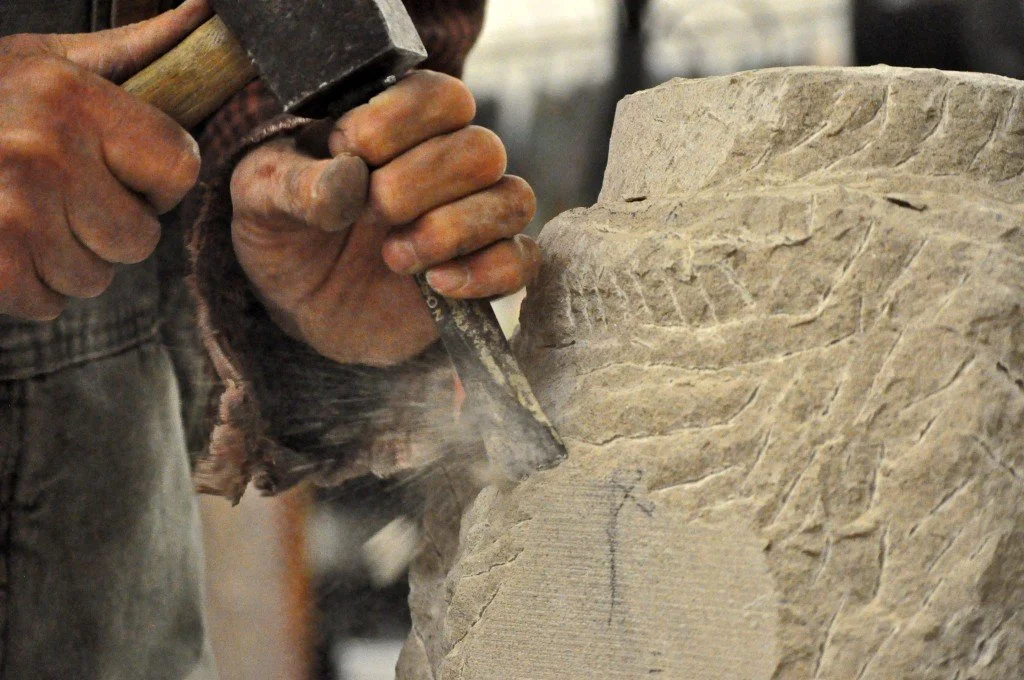“Hope in Motion”
Nineteenth Sunday After Pentecost
October 19, 2025
sculpting stone takes time and pressure
Genesis 32:22-31
Luke 18:1-8
Children’s Message:
When have you had to keep trying at something? What helps you keep going when things feel tough? I’m going to try getting these cards in the offering plate. Do you think I can do it? Do you think YOU can do it?
Well, today we heard two stories about struggling and being persistent. The first one is about Jacob. He spent a whole night wrestling with God, and in the end, God blessed him. The second story is about a woman who kept pestering a judge who didn’t care about her. In both stories, their persistence finally got them what they needed. But it wasn’t easy.
When you’re learning something new, is it sometimes difficult? Do you have to spend a lot of time on it? Is it worth it?
God is like the woman who kept pestering the judge. God keeps working on us. God keeps pestering us. God keeps challenging us. God keeps guiding us until we finally, hopefully, see how much God loves us and how much God loves others. That’s a LOT of practice and work and time, but God thinks we’re worth it.
Let’s pray. Dear God, you refuse to leave us alone, no matter how often we turn away. Help us be as persistent with others as you are with us. Amen.
Message:
It’s a parable about praying always without losing heart. It seems that to do anything these days without losing heart is a big ask. It really doesn’t take much for me to hit a wall and just say, “This is too hard.” Or, “What difference does it make, anyway?” The first statement is one of weariness. The second, one of wariness. In either case, the faithful work comes to a halt. And we sink, dejected, into the miasma of defeat.
But that’s a privileged response to the difficult work before us. For many in our community, quitting simply isn’t an option. Protecting themselves from disappointing news isn’t an option. Turning away from the problems and challenges isn’t an option. Getting distracted by more interesting things isn’t an option. The truth for far too many is that the only way forward is through. And turning back, turning sideways, sitting down in defeat is death.
Faithful persistence is hope in motion.
Jesus’ parable creates a stark difference between the widow and the judge. In one corner, we have a woman whose husband has died. While we don’t know much about their financial situation, widows are often left to fend for themselves with limited resources and virtually no rights. We’re not told anything about her opponent, but for one in her position, any opposition could mean the difference between life and death. So, she takes her case to the judge—the local authority whose job it is to settle disputes and dispense justice.
In the other corner, then, we have a man of authority. He is self-described as one who doesn’t care about justice, doesn’t care about humanity, doesn’t care about God. He only cares about himself. He has power without concern of consequences or accountability. He is above the law and serves only his own self-interests.
It’s a David-and-Goliath situation. The one with nothing up against the one with everything. How many times have the disciples felt like this woman? How many times would they go up against authorities after Jesus’ death and resurrection? How many times have you been in a position that feels untenable?
So Jesus pits this widow and judge against each other. The one with absolutely no power or autonomy begins to peck away at the granite of authority. It reminds me a bit of the movie, “The Shawshank Redemption.” The innocent man unjustly sentenced and unjustly kept behind bars begins to peck away—not at a person but at the wall. It’s a study of time and pressure, he says. Time and pressure. Like the widow—she just keeps coming back. Again and again and again. She doesn’t stop. She doesn’t sway. She doesn’t back down. She doesn’t turn away. Time and pressure.
Faithful persistence is hope in motion.
Does she place her hope in the judge? No. But she does have hope. Perhaps that’s all she has. Hope…and time. Time and pressure. Hope, time, pressure, and a holy struggle. As theologian Bruce Epperly said, “Struggle is at the heart of faith, and certain seasons may test us beyond our current endurance. God’s faith in us is more important than faith in God, and God will not abandon us.”
Now, there are some different thoughts on Jesus’ recap of the parable. One thought is that Luke received a portion of the parable and felt the need to tie it up with a bow rather than let it dangle without explanation. So, he added his words about God in comparison to this judge. But what if we left the parable without explanation? What if we compare God to the widow rather than the judge?
This God who sends prophet after prophet after prophet to the people—people who often show no care for God or humanity. This God who persists against the injustice of this world through the faithful response of the least of these—the widows, the orphans, the hungry, the poor, the imprisoned, the dejected, the marginalized, the queer, those of color, the immigrant, the powerless.
It’s a parable about praying always without losing heart. Because prayer changes us—not God. Prayer gives us strength. Prayer gives us courage. Prayer gives us faith and persistence and hope. Prayer reminds us that God is with us in the struggle.
Prayer reminds us that faithful persistence is hope in motion.
Pastor Tobi White
Our Saviour’s Lutheran Church
Lincoln, NE

